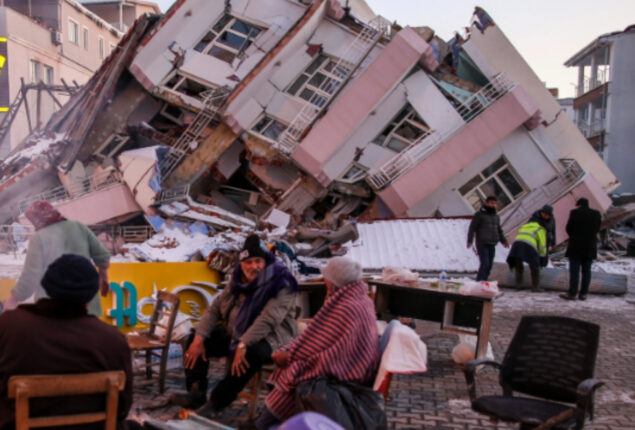Turkey discovers a fresh survivor roughly 12 days after the earthquake
Turkish rescuers retrieved a 45-year-old man from the rubble on Friday Rescuers...

Turkey is outraged over substandard construction as ‘earthquake-proof’ homes collapse
Tenants of a luxury housing complex in southern Turkey believed their flats were ‘earthquake-proof’ until the edifice collapsed like a domino in last week’s terrible earthquake, killing hundreds.
The wreckage of the Ronesans Rezidans, which was billed as “a piece of paradise” when it first opened a decade ago, has now become a source of public outrage.
Survivors wait for word of loved ones by the mound of debris that was the 249-apartment block, as their hopes of survival wane.
“My brother lived here for ten years… It was said to be earthquake safe, but you can see the result,” said 47-year-old jeweller Hamza Alpaslan.
“It was introduced as the most beautiful residence in the world. It’s in horrible condition. There is neither cement nor proper iron in it. It’s a real hell,” he added.
Eleven days after the earthquake that killed over 43,000 people in Turkey and Syria and displaced millions, Turkish indignation is increasing over what they regard as unethical construction methods and severely faulty urban plans.
According to Turkey’s Urbanization Ministry, 84,700 buildings have collapsed or have been seriously damaged.
While the Ronesans Rezidans, or “Renaissance Residence,” had collapsed, numerous older buildings on the street remained standing.
“We rented this place as an elite place, a safe place,” said Sevil Karaabduloglu, whose two daughters are under the rubble.
Missing Ghanaian international footballer Christian Atsu who played for local team Hatayspor is also believed to have lived in the complex.
Turkey has committed to investigating the building collapse and has so far interviewed 246 people, including 27 developers, 27 of whom are being detained by police.
“No rubble is cleared without collecting evidence,” said Justice Minister Bekir Bozdag.
“Everyone who had a responsibility in constructing, inspecting, and using the buildings is being evaluated.”
The ruling AK Party of President Tayyip Erdogan has placed a high value on building, which has helped drive growth throughout its two decades in office, though the industry has suffered in the last five years as the economy has faltered.
Opposition parties accused his government of failing to enforce building laws and of misusing special levies levied after the last large earthquake in 1999 to make structures more earthquake resistant.
Turkey fell 47 places in Transparency International’s Corruption Perception Index to 101 in the ten years to 2022, from 54 out of 174 nations in 2012.
Erdogan argues the opposition lies in order to discredit the administration and stymie investment.
A damaged governmental building connected to Turkey’s Urbanisation Ministry lies three kilometers distant from the Renaissance Residence, and locals and activists claim critical records relating to building safety and quality control are scattered amid the wreckage.
Omer Mese, an Istanbul lawyer, said he has been keeping an eye on the ruins and is attempting to salvage what could be essential evidence, despite the fact that some documents have been destroyed as individuals left homeless hunt for anything they can burn for warmth.
“There were a lot of official documents with original signatures. It was essential to save and protect them… so that those responsible for this disaster can be brought to justice,” he said, adding the papers included data on concrete and earthquake resistance tests.
“I read the news about contractors arrested after the earthquake but when we think about this destruction and its extent… there should be more,” he added.
The Urbanisation Ministry said documents would be moved to the ministry archive in the city and were stored digitally.
According to industry officials, over half of Turkey’s total 20 million buildings violate construction rules.
The government implemented a zoning amnesty in 2018 to legalise unregistered construction projects, which engineers and architects warned may jeopardise lives.
Over 10 million people petitioned for amnesty, with 1.8 million petitions accepted. Property owners had to pay to register their structures, which were subsequently subject to a variety of taxes and levies.
The administration stated that it was necessary to eliminate conflicts between the state and residents and to legalise constructions.
“Unfortunately the zoning amnesty in our country is somehow
considered a public blessing,” Mese said.
“We have become a society that lives by considering it a plus to put something off for a day, but we end up being crushed by the consequences of that. That is the problem.”
Catch all the World News, Breaking News Event and Latest News Updates on The BOL News
Download The BOL News App to get the Daily News Update & Follow us on Google News.